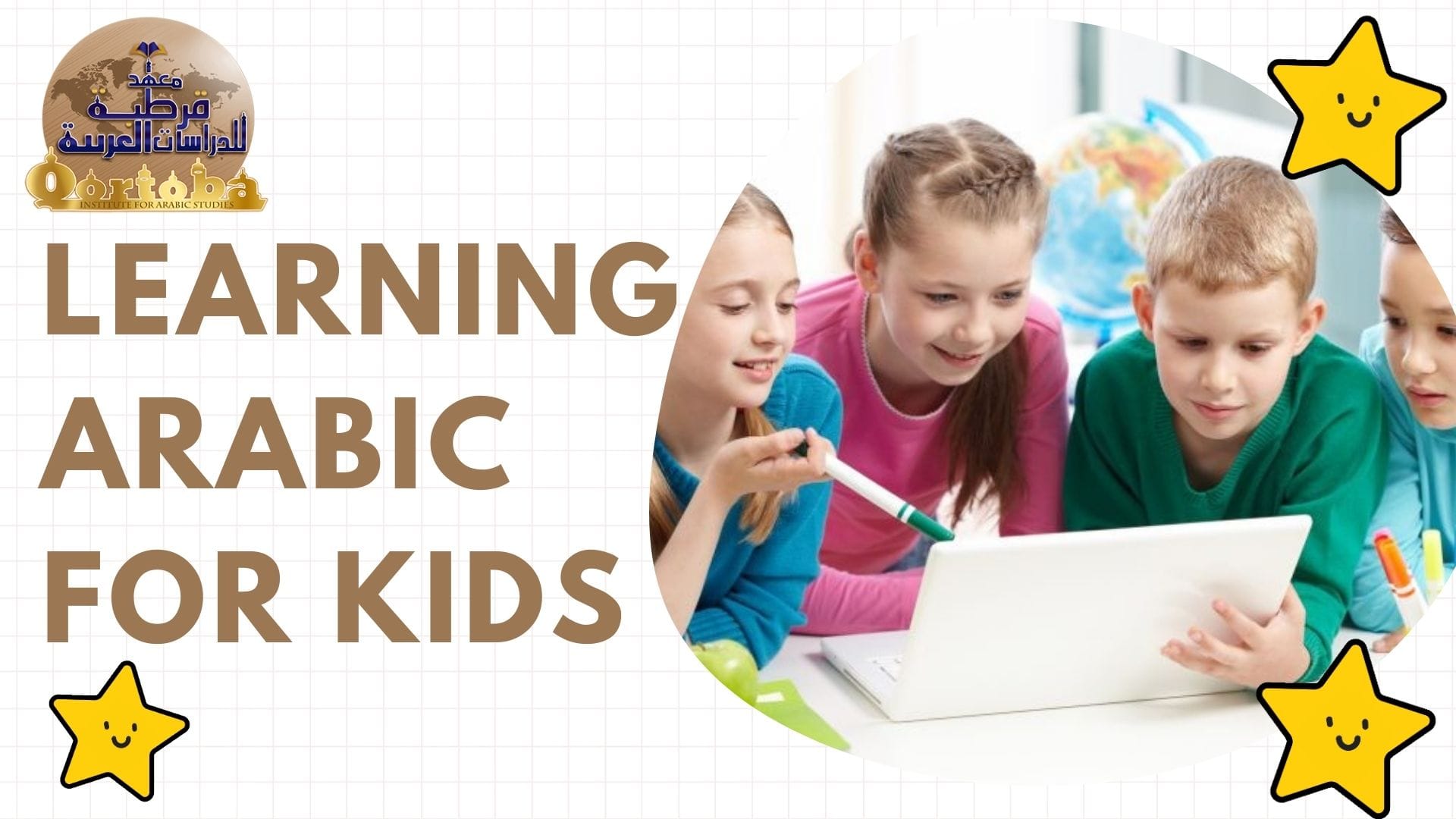
LEARNING ARABIC FOR KIDS | Qortoba
LEARNING ARABIC FOR KIDS JUST A PIECE OF CAKE QIAS SPECIAL COURSES FOR CHILDREN
Doubtless, for non-native speaker families living in places like America, Britain, Germany, France, or Canada, raising children with a strong sense of Islamic identity and mastering Arabic language can feel like walking a tightrope. On one hand, there’s the desire to integrate into society and thrive academically. On the other, there’s the deep responsibility to pass on the language of the Qur’an and the values of the faith. Thereupon, QIAS Qortoba Institution for Arabic Studies steps in — not just as an online hub, but as a partner in parenting.
Why Arabic and Qur’an Matter for Kids?
Arabic isn’t just another language. It’s the key to understanding the Qur’an, the prayers, and the rich heritage of Islamic scholarship. As the Qur’an says:
“Indeed, We have sent it down as an Arabic Qur’an so that you may understand.”
(إِنَّا أَنزَلْنَاهُ قُرْآنًا عَرَبِيًّا لَّعَلَّكُمْ تَعْقِلُونَ)
But let’s be honest — most parents in the West aren’t fluent in Arabic, and teaching it at home can feel like trying to build a house without tools. That’s why QIAS special children’s courses are such a breath of fresh air.
What Makes QIAS Kids Program Special?
QIAS Arabic and Qur’an courses for children aged 5 to 12 are built with care, structure, and a deep understanding of how kids learn best. The curriculum is based on the Al-Madina syllabus, which is widely respected for teaching Arabic to non-native speakers.Given; it ranges from the Arabic alphabet to advanced conversation and writing. Each level includes:
40 hours of book-based learning (reading, writing, vocabulary, grammar)
10 hours of interactive tools (games, coloring, videos, oral practice)
This mix keeps non -native speaker kids engaged and helps them absorb the language naturally. Think of it like sneaking vegetables into a smoothie — they’re learning without even realizing it.
Real-Life Example: Sara in London
Sara , age 7, started with zero Arabic. Within a few months, she was greeting her grandparents with:
السلام عليكم، كيف حالكم؟ “Peace be upon you, how are you ? “
She could recite Surah Al-Falaq and even explain
What(” شر النفاثات في العقد” ) the evil of those who blow on knots means. Her parents were amazed — and relieved.Furthermore,
Most common Arabic phrases are learned specially for non-native speaker Kids.
Most Useful Phrases Taught in the Beginner Levels:
السلام عليكمPeace be upon you ,Greeting family or friends
حالك؟ كيف How are you? Starting a conversation
الحمد للهPraise be to God ,Responding to “How are you” ما اسمك؟
What is your name? Introducing themselvesأنا أحب المدرسة
I love school, talking about their dayهل تحب القراءة؟ Do you like reading?, practicing questions .These phrases aren’t just memorized — they’re used in role-play, games, and conversations with teachers. It’s language learning with heart.
QIAS Follow up Assessments
Each level includes two exams — one halfway through and one at the end — plus points for homework, participation, and attendance. Kids need at least 60% to move up, but the focus isn’t on pressure. It’s about progress for non non- native speaker children worldwide such as America, Britain, Germany, France, or Canada .Thus, parents get regular updates, so they’re never left in the dark. It’s a team effort.
QIAS Special Courses for Children Instructors
QIAS instructors are native Arabic speakers specialized in teaching non- native speaker kids all over the world such as America, Britain, Germany, France, or Canada. They’re patient, encouraging, and know how to make learning fun. As teachers hold : “We don’t just teach letters. We teach love for the Qur’an.”
نحن لا نُعلِّم الحروف فقط، بل نُعلِّم حب القرآن.
More live Stories That Hit Home
John, age 9, in Chicago, used to dread Arabic class. But once he started with QIAS , he got hooked on the games and videos. Now he’s the one reminding his siblings to log in for their lessons.
Emma , age 6, in Berlin, struggled with pronunciation. Her teacher used songs and repetition, and now she’s the loudest voice in the family when it’s time to recite Surah Al-Ikhlas.
In a nut shell , raising non- native speaker children across the globe such as America, Britain, Germany, France, or Canada with a love for Arabic and the Qur’an necessary —it’s worth every ounce of effort. As the Prophet ﷺ said:
“The best of you are those who learn the Qur’an and teach it.”
خَيْرُكُمْ مَنْ تَعَلَّمَ الْقُرْآنَ وَعَلَّمَهُ
QIAS Qortoba Institution for Arabic Studies isn’t just teaching language. It’s helping parents plant seeds of faith, identity, and pride — seeds that will grow for a lifetime, planting seeds that last.
Tag:arabic, Arabic alphabet, Arabic Grammar, Arabic language, Arabic languages . Arabic languages . arabic alphabet . arabic alphabet in english . arabic curriculum for kids ., française, learn Arabic languages . Arabic languages . arabic alphabet . arabic alphabet in english . arabic curriculum for kids ., Pourquoi étudier la langue arabe #Joyeux420 #ThePope #Ozil #XDDL #ResurrectionSunday #Resurrection Arabic alphabet, The importance of learning languages, Uncategorized Arabic alphabet, world Arabic language day . française













